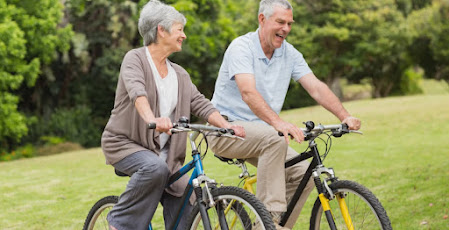Sarcopenia is the age-related, progressive loss of muscle mass and
strength. The main symptom of sarcopenia is muscle weakness.
Sarcopenia is a type of muscle atrophy primarily caused by the natural
aging process. Scientists believe being physically inactive and eating
an unbalanced diet can contribute to the disease.
How bad is it?
It is a common condition in people over 50 years old, although less active people begin to lose up to 3% muscle mass per year after the age of 30. This doesn't sound like a lot but it continues year after year. And it happens even faster after age 50, increasing to as much as 8%. This not only limits the ability to perform many routine activities but also shortens life expectancy in those it affects, compared
to individuals with normal muscle strength. It also greatly increases the chance of losing your balance and taking a fall, a major health risk for the elderly.
Although aging is the most common cause of sarcopenia, other factors can
also trigger increasing muscle atrophy. The most common of these are:
1. Inactivity
Disuse of muscle is one of the strongest triggers of sarcopenia, leading to faster muscle loss and increasing weakness, and it can happen rapidly. Bed rest or immobilization after an injury or illness leads to rapid loss of muscle and as little as two to three weeks of decreased walking and other
regular activity is also enough to decrease muscle mass and strength.
Periods
of decreased activity can become a vicious cycle. Muscle strength
decreases, resulting in greater fatigue and making it more difficult to
return to normal activity.
2. Low Protein Intake
A diet providing insufficient calories from protein results in weight loss and diminished muscle mass. Unfortunately,
low-calorie and low-protein diets become more common with aging, due to
changes in sense of taste, problems with the teeth, gums and
swallowing, or increased difficulty shopping and cooking.
To help prevent sarcopenia, scientists recommend consuming 25–30 grams of protein at each meal.
3. Inflammation
After an injury or illness, or in the case of certain chronic conditions such as arthritis, inflammation sends signals to the body to tear down and then rebuild the damaged groups of cells. Chronic
or long-term diseases can also result in inflammation that disrupts the
normal balance of teardown and healing, resulting in muscle loss.
Examples of diseases that cause long-term inflammation include rheumatoid arthritis, inflammatory bowel diseases like Crohn's Diosease or ulcerative colitis, lupus, vasculitis, severe burns and chronic infections like tuberculosis.
4. Stress
Sarcopenia is also more common in a number of other health conditions that increase stress on the body. For example, people with chronic liver disease, and up to 20% of people with chronic heart failure, experience sarcopenia. In chronic kidney disease, stress on the body and decreased activity lead to muscle loss and cancer and cancer treatments also place great stress on the body, resulting in sarcopenia.
There is some good news though, and that is that aging, per se, does not make sarcopenia inevitable. In fact there is a great deal that we can do to prevent or even reverse it. Men and women can regain some of that lost muscle mass and, importantly,
stay strong enough to enjoy youthful activities well into their winter
years, experts say. You are never too old to take action. Read more about how here.
The bad news? You actually do have to take action.




